 "Peter
Duel, co-star of the ABC television series Alias Smith and
Jones was found shot to death early today at his Hollywood
Hills home" stated the Associated Press story quite matter-of-factly.
"Peter
Duel, co-star of the ABC television series Alias Smith and
Jones was found shot to death early today at his Hollywood
Hills home" stated the Associated Press story quite matter-of-factly.
 "Peter
Duel, co-star of the ABC television series Alias Smith and
Jones was found shot to death early today at his Hollywood
Hills home" stated the Associated Press story quite matter-of-factly.
"Peter
Duel, co-star of the ABC television series Alias Smith and
Jones was found shot to death early today at his Hollywood
Hills home" stated the Associated Press story quite matter-of-factly.
"Detectives said Duel apparently died of a bullet wound in the wound in the head. The death is being listed as a possible homicide."
Reading the wire story, which was carried in every major newspaper in the country, Peter Duel's death appeared to be just another Los Angeles police case
But was it? Had the young actor, indeed, been murdered by some unknown, mysterious intruder? Or, had it been an accident?
In the days that followed his sudden death, there was great speculation that Peter's death was neither an accident nor a murder. People who knew the young actor, both acquaintances and close friends, believe Peter took his own life. That his death was actually an act of suicide, an act created out of despondency.
One of the people most convinced that Peter took his own life is Dianne Ray, Peter's constant companion of the last year.
Peter and Dianne had met when he appeared as a guest star last season on The Psychiatrist which, starring Roy Thinnes, was a segment of the NBC series, Four In One.
Since meeting on the set of The Psychiatrist, where Dianne had worked as a production assistant, the couple had spent a great deal of time together. And although Dianne maintained her own apartment, the couple spent most of their time at Peter's small, modest Hollywood Hills home.
In fact, Dianne and Peter were together the night of the tragedy, and it was Dianne who had called the police, in hysterical shock, to report Peter's death.
In her account of what happened that evening Dianne told police that she had spent the evening with Peter watching first Alias Smith and Jones and then a basketball game on television.
Later, only minutes before the shooting, Dianne said she had walked into Peter's bedroom and caught him unwrapping a gun, which he had evidently taken from either the closet or a dresser drawer.
According to the Los Angeles police report, Dianne said she asked Peter what he was doing with the gun but that he only replied, "I'll see you in a little while" and walked from the bedroom to the living room.
Seconds later Dianne told police she heard a shot and, rushing into the living room, found Peter lying dead at the foot of the Christmas tree they had decorated only a week before. The gun was lying a short distance from the body.
The time was 1:25 a.m., December 31. It was New Year's Eve day, the beginning of a new year that Peter would never see. He had died instantaneously from a small bullet wound in the head.
If there was speculation on the circumstances surrounding Peter's death, there was equal speculation as to why the young actor, star of a popular television series, would want to take his own life.
Dianne told police officers that Peter had been despondent because he felt he had been drinking too much. But why was he drinking so much? Why was he so unhappy, so moody and depressed?
Perhaps the answer lies within the context of an exclusive interview this writer had with Peter only a few weeks before his tragic death. In the light of his subsequent death, his words are haunting--like a confession from beyond the grave.
It had been a strange interview. Peter had been in a happy-go-lucky mood, but it was a mood tinged with bitterness and frustration.
He sat in the Universal studio commissary, a cigarette clasped tightly in his teeth, his shoulders hunched in subconscious rebellion against almost everything and everyone, and he had talked about his life and his career with, what at the time appeared to be resignation.
"Yeah. I've been pretty outspoken about how I feel about this television series. I hate it. I never wanted to do it.
"But," he had added, with a shrug, "I'm stuck. I'm under contract."
He had then sighed and, after taking a long drag on his ever-present cigarette, had continued with: "I think last season I hated everything and everyone. I hated the series and the whole idea of being in a television series. In fact, looking back I think I was as close to a nervous breakdown as ever want to be.
"I realize that's a very dramatic statement," be added. "but day by day, week by week, inch by inch, I was getting more and more unhappy, more and more frustrated.
"But then, one day, I drew back and took a look at what would make me happy and I realized I was taking the series too seriously. I realized that to survive I was going to have to have a hang-loose attitude.
"So now I'm simply trying to accept the series and trying to enjoy what I have to do. It isn't easy, though, especially when I think what I might have done, might have accomplished in this last year I've had to spend in this series.
"I really managed to trap myself," he continued, wrinkling his face in disgust. "I see now that signing the contract with Universal was a very foolish thing for me to do. I didn't have enough self-confidence, enough self-love to say no. I guess it was a blind spot on my part, but my agent recommended it. And it was a gamble.
"I almost won, though," he had added, with a wry smile. "Everything was going well until last year. Then time ran out. I owed Universal a series. and they came up with this one and that was that.
"If I'd only had one more year." he'd said, wistfully, "things might have been different."
Perhaps that was one of Peter's big problems and the cause for his constant frustration. He was always trying "to make things different." Yet, for one reason or another, in his own mind he never ever quite, achieved his goal. He was desperately determined to be someone, to find his own personality, his own niche, his own success in the world. But he always seemed to be thwarted. He always looked like a loser to himself and could never shake loose from that self-image. He never had enough love for himself--and that was the only love that could have saved him from committing that last, tragic act.
In retrospect one can see that his life was a constant search for self-recognition and self-love.
Born in Rochester. N.Y.. the son of Dr. Ellsworth S. Deuel and the former Lillian M. Ellstrom, Peter came from a wealthy background.
Yet. when he first appeared on the Hollywood scene, he tried to cover up his family and his upbringing. His language was filled with four-letter words and his manner of dress was more reminiscent of Appalachia poor than Rochester rich.
Once he became aware that his background was well known, he dropped the affectation and no longer tried to be something he was not.
In recent months, however, he had undergone another transformation. He had taken to wearing his hair very long and wearing hippie garb when not working. He also had become a vegetarian, he had explained, because "when I started learning about nutrition I found that what I'd thought was nutritious wasn't."
But perhaps the most telling change in Peter's life-long pursuit of self was his recent change of name, from Deuel to Duel, which he explained as being "and exciting thing" during our luncheon interview.
"I got quite a kick out of it," he had smiled "because Duel is my name while the other I shared with my parents, my brother and my sister."
And then, talking about his family, Peter had confided that "the only thing I ever wanted to be was a pilot.
"But," he had added ruefully, "I had my eyes tested and my vision wasn't good enough. I could have been a navigator but I wanted to be a pilot and wouldn't settle for anything less."
Perhaps therein lies the answer to Peter Duel's year-long siege of depression. His personality was such that he could not tranquilly "settle for anything less." Yet he'd been forced to by having to fulfill his Universal contract.
Fighting his own instincts, attempting to sublimated his own personality, he'd tried to intellectually control what was emotional pressure. He'd tried to ride it out, but he'd failed. The unhappiness, the feeling of being trapped, of wasting his life, had to emerge somehow, whether through open hostility or through drinking.
Peter had only been kidding himself the day of our interview when he confided. "I'm trying to look on the positive side of things. I'm not enchanted doing a series but I've accepted the fact.
"Anyway," he'd added, with that wry laugh, "this series can't last forever, can it?"
Two weeks after being notified by ABC that Alias Smith and Jones had been renewed for the rest of the 1972 season, Peter Duel's life ended.
It was New Year's Eve day, the beginning of another year Peter obviously felt he couldn't face having once again to "settle for less."
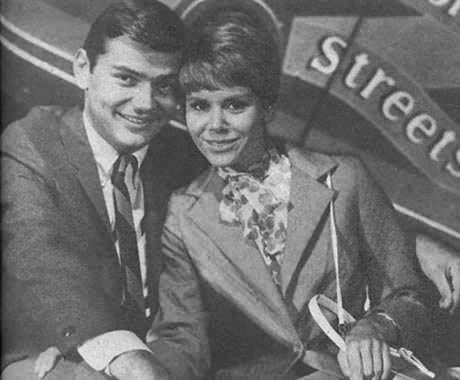 Photo
Caption: Pete was close to Judy Carne during Love on a
Rooftop. There were hints they were more than friends. But
that ended with the series.
Photo
Caption: Pete was close to Judy Carne during Love on a
Rooftop. There were hints they were more than friends. But
that ended with the series.
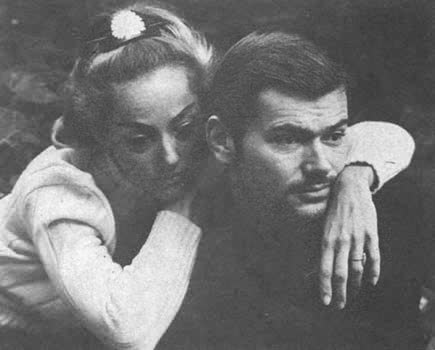 Photo
Caption: Pete had several romances in Hollywood. For a while
he was engaged to Jill Andree, but wedding bells never rang for
the two of them.
Photo
Caption: Pete had several romances in Hollywood. For a while
he was engaged to Jill Andree, but wedding bells never rang for
the two of them.
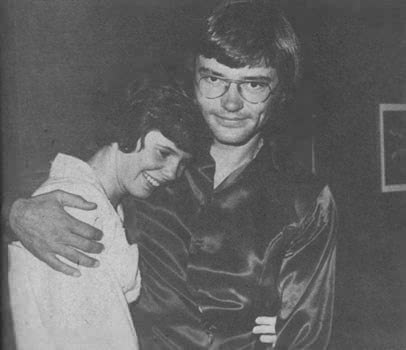 Photo
Caption: Kim Darby seemed to be the answer to Pete's prayers--until
their relationship ended in disillusionment, and once again he
was alone.
Photo
Caption: Kim Darby seemed to be the answer to Pete's prayers--until
their relationship ended in disillusionment, and once again he
was alone.
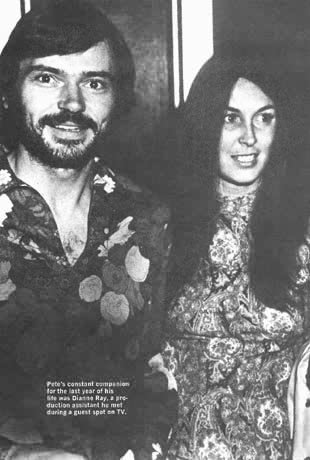 Photo
Caption: Pete's constant companion for the last year of his
life was Dianne Ray, a production assistant he met during a guest
spot on TV.
Photo
Caption: Pete's constant companion for the last year of his
life was Dianne Ray, a production assistant he met during a guest
spot on TV.
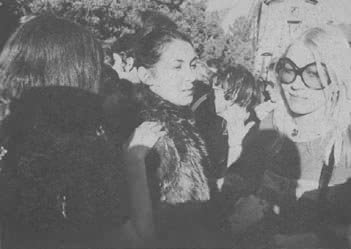 Photo
Caption: Girlfriends consoled Dianne, center, after the funeral
services for Pete. She was with him in his Hollywood Hills home
the night he died.
Photo
Caption: Girlfriends consoled Dianne, center, after the funeral
services for Pete. She was with him in his Hollywood Hills home
the night he died.
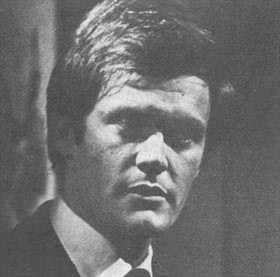 Photo
Caption: Roger Davis, formerly on Dark Shadows, will
take over the role of Hannibal Heyes that Pete left vacant on
Alias Smith and Jones.
Photo
Caption: Roger Davis, formerly on Dark Shadows, will
take over the role of Hannibal Heyes that Pete left vacant on
Alias Smith and Jones.